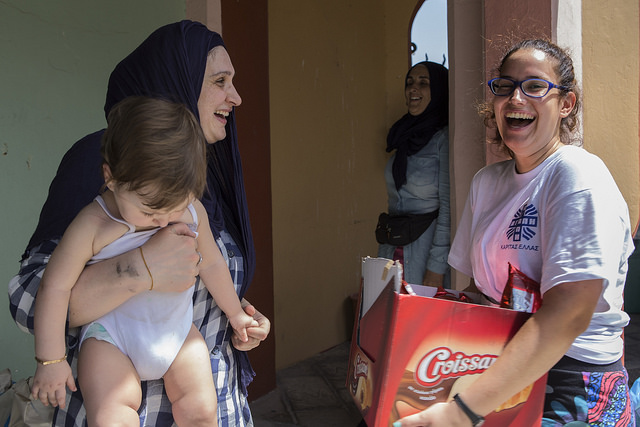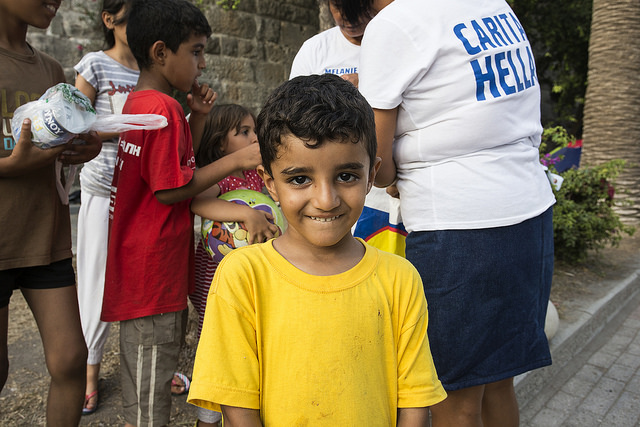Mihaela Condac is an emergency coordinator for diocesan Caritas Iasi in Romania. She is working with Caritas Greece to help them coordinate volunteers in responding to the refugee crisis.
“Mum, how many countries do we still have to cross until we are home?” said a child who’d just landed, one of the 2000 refugees and migrants who arrive every day on the Greek island of Lesbos. Almost 400,000 people have gone through Greece this year, putting huge pressure on the government and aid agencies to respond.
The crisis is a big challenge for all Caritas organisations in Europe and around the world. We are doing our best to help the refugees with professionalism and compassion.
Caritas Hellas (Caritas Greece) is a small organisation. They’re only a few staff who must deal with a huge number of refugees every day. On the islands, Caritas Hellas works with volunteers. They have their regular jobs, but still there is a big desire to help people in need.

Caritas volunteer and a Syrian refugee family on Rhodes. Credit: Natalia Tsoukala/ Caritas Internationalis
“It breaks my heart to see all these children sleeping on the street near the port waiting their turn to go in the boat for Athens,” said Magdalena, a Caritas volunteer from Lesbos.
“Sometimes I ask a day off from my job to be able to help Caritas in Kara Tepe transit camp to distribute things to the most vulnerable families. But we are not prepared for this,” she said.
This is why it was so important for me to be here. I’ve worked in emergency situations for ten years with Caritas Romania. I’m in Greece to train local groups of volunteers so they can be better prepared and organised to help. I teach people how to make a good assessment of the needs, how to organise a distribution but also to pay attention to the security and to the mental demands of the team. It’s not easy to work in such an environment emotionally.
When the people come out of the boats they are wet. The children are shaking and crying. They need dry clothing to change into immediately.
In Lesbos, they’re transferred by bus to two camps. There, Caritas is distributing sleeping bags and mats to the women and children so they’ll be warm during the night. The temperatures are decreasing now. At night it’s 15 degrees. The high humidity makes it feel colder.
In Chios, it’s the same situation. On 6 October, 1500 arrived. There is only one camp, which is not big enough for all the people that are coming. Caritas was there to distribute sleeping bags and mats. The volunteers received training in the morning and after that we organised the distribution.
We put in practice what we learned. When possible, we involve the refugees in the distributions. On that day, Azad, an Afghan boy who was spoke English helped us with the translation. He explained to the people that we were giving things to the most vulnerable – women and children.
In Rhodes, the volunteers were very happy to have the training. “It helps us not only with the refugees, but also in our daily work with the poor people on the island that knock every day on our door to ask for help” said Fr. Luke, the parish priest.
A fisherman told me that he saw a mother with 4 children going to the camp by foot. They had no shoes. So he took them by car to a hotel, his wife found shoes and prepared a meal and they took care of them.
Greek people already have had a hard times because of the economic crises, but still they bring food to the refugees or they give clothes and shoes. The solidarity is big but they don’t have resources. Caritas is trying to help the poor people from Greece but their means are limited too.
International help is needed here. That’s why the global Caritas network mobilised to help Greece. We are here with colleagues form many Caritas organisations. Here the idea of the Caritas family has a meaning, it is not just a word written on paper.

